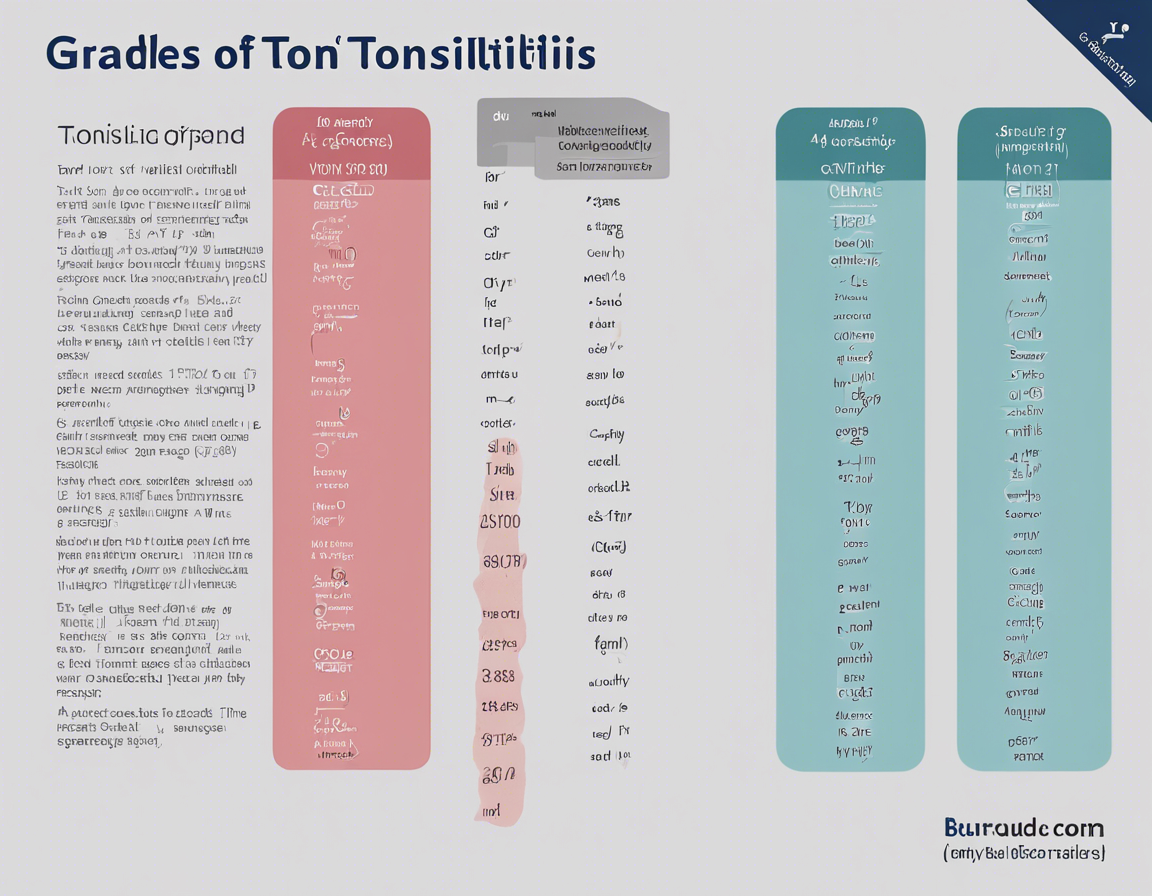
Understanding the Grades of Tonsillitis
Tonsillitis is a common condition that affects both children and adults, causing inflammation of the tonsils, which are two oval-shaped pads of tissue at the back of the throat. The severity of tonsillitis can vary, and it is often categorized into different grades based on various factors such as symptoms, duration, and the presence of complications. In this article, we will delve into the different grades of tonsillitis, ranging from mild cases that can be managed at home to more severe cases that may require medical intervention.
Grades of Tonsillitis
Grade I: Mild Tonsillitis
- Description: Mild tonsillitis is characterized by mild throat discomfort, slight redness of the tonsils, and minimal swelling.
- Symptoms: Sore throat, mild hoarseness, difficulty swallowing, occasional fever.
- Management: Rest, hydration, warm salt water gargles, over-the-counter pain relievers (e.g., acetaminophen, ibuprofen).
Grade II: Moderate Tonsillitis
- Description: Moderate tonsillitis presents with more pronounced redness and swelling of the tonsils and can be accompanied by white patches or pus.
- Symptoms: Severe sore throat, difficulty swallowing, fever, chills, enlarged and tender lymph nodes in the neck.
- Management: Medical evaluation by a healthcare provider, possible need for antibiotics (if bacterial), throat lozenges, warm liquids, rest.
Grade III: Severe Tonsillitis
- Description: Severe tonsillitis is characterized by severe inflammation and enlargement of the tonsils with extensive white patches, pus, or ulceration.
- Symptoms: Very painful sore throat, difficulty opening the mouth, fever exceeding 101°F (38.3°C), difficulty breathing or swallowing.
- Management: Immediate medical attention, possible hospitalization, intravenous antibiotics, corticosteroids to reduce inflammation, fluid replacement, pain management.
Chronic or Recurrent Tonsillitis
- Description: Chronic tonsillitis refers to frequent episodes of acute tonsillitis or persistent inflammation of the tonsils, often lasting for an extended period.
- Symptoms: Frequent sore throats, persistent bad breath, enlarged tonsils with crypts, snoring or sleep apnea.
- Management: Evaluation by an ENT specialist, consideration of tonsillectomy (surgical removal of tonsils) in cases of recurrent infections or other complications.
Frequently Asked Questions (FAQs) about Tonsillitis
1. What causes tonsillitis?
- Tonsillitis is commonly caused by viral infections (e.g., adenovirus, influenza virus) or bacterial infections (most commonly Streptococcus bacteria).
2. How is tonsillitis diagnosed?
- Tonsillitis is diagnosed based on medical history assessment, physical examination of the throat, and sometimes swab tests to identify the causative agent.
3. Are antibiotics always necessary for treating tonsillitis?
- Antibiotics are not always necessary as viral tonsillitis does not respond to antibacterial medications. However, bacterial tonsillitis (such as strep throat) may require antibiotics.
4. When should I seek medical help for tonsillitis?
- Medical attention is recommended if you experience severe throat pain, difficulty breathing or swallowing, persistent high fever, or recurrent tonsillitis episodes.
5. Can tonsillitis lead to complications?
- Untreated tonsillitis can lead to complications such as peritonsillar abscess, rheumatic fever, glomerulonephritis, or airway obstruction in severe cases.
6. Is surgery always necessary for chronic tonsillitis?
- Surgical removal of tonsils (tonsillectomy) may be considered for chronic or recurrent tonsillitis cases that do not respond to conservative treatments or when complications arise.
7. How can tonsillitis be prevented?
- Practicing good hygiene, avoiding close contact with sick individuals, staying hydrated, and strengthening the immune system through a healthy lifestyle can help prevent tonsillitis.
In conclusion, understanding the different grades of tonsillitis is crucial in determining the appropriate management and treatment approach for individuals experiencing this condition. By recognizing the severity of symptoms and seeking timely medical intervention when needed, individuals can effectively manage tonsillitis and prevent potential complications. If you suspect you have tonsillitis or are concerned about your symptoms, consult a healthcare provider for proper evaluation and guidance tailored to your specific situation.


